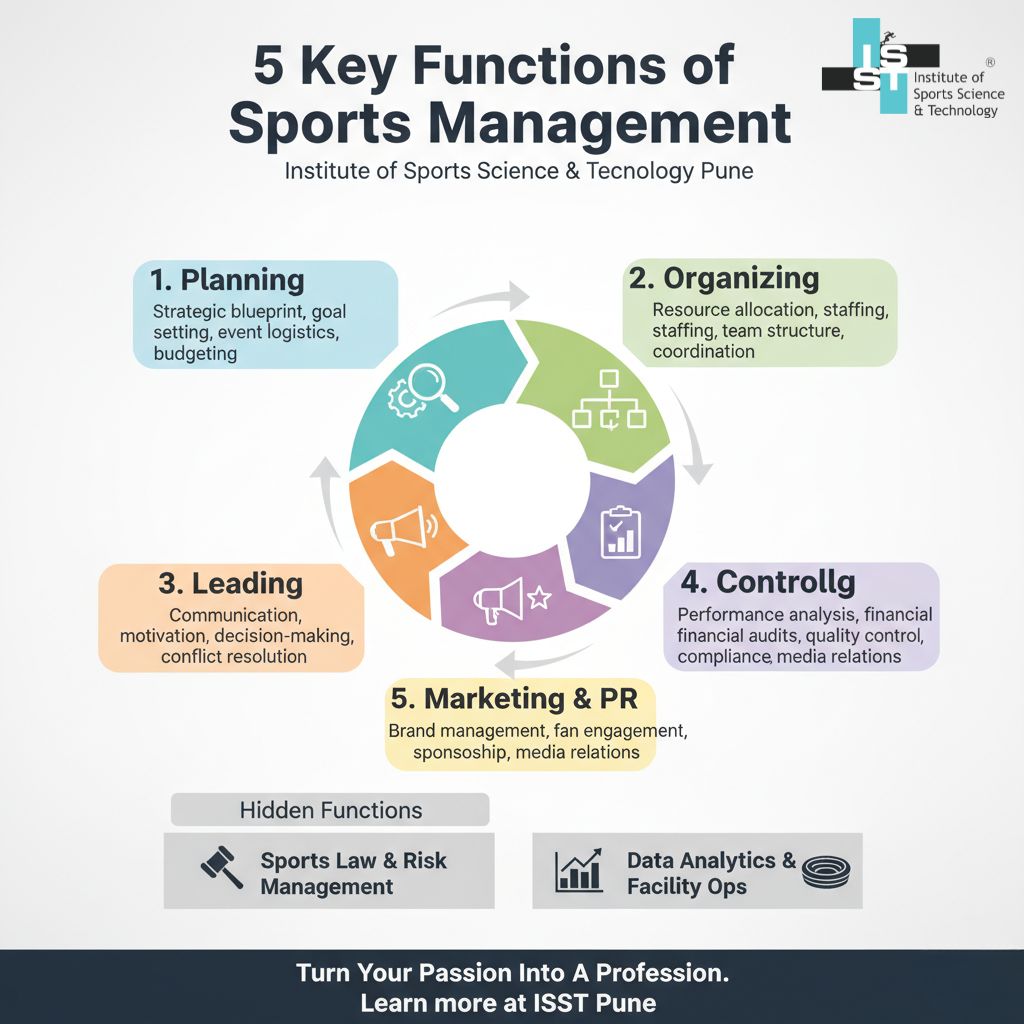Function of sports management
Ever watched the final moments of a thrilling match—a last-minute goal, a buzzer-beating shot—and wondered, “How did this all come together?” We see the athletes, the coaches, and the roaring crowd. But behind every single sporting event, from a local 5K run to the FIFA World cup, there’s a complex, high-stakes operation running in parallel. This invisible engine is sports management.
Many people mistake sports management for just coaching or marketing. In reality, it’s the entire business and logistical framework that allows sports to exist and thrive as a global industry. Understanding the function of sports management is the first step for anyone aspiring to move from being a spectator to a decision-maker in this dynamic field.
This post will break down the essential functions of sports management, what sports managers actually do, and how you can build the skills to join their ranks.
What is Sports Management, Really?
At its core, sports management is the application of business principles—like planning, finance, marketing, and law—to the sports industry. A sports manager is the professional who handles the “business of sports,” ensuring the organization (be it a team, a league, or an event) runs smoothly, efficiently, and profitably.
They are the strategists, the negotiators, and the leaders working in the front office, not just on the sidelines. Their work allows athletes to focus on what they do best: compete.
To truly grasp the scope, it helps to break down the primary functions using a classic management framework. The key functions of sports management can be broadly categorized into Planning, Organizing, Leading, and Controlling (P-O-L-C), with a special emphasis on marketing and public relations.
The 5 Core Functions of Sports Management

While a sports manager’s day-to-day tasks vary, they all revolve around these five fundamental pillars.
1. Planning: The Strategic Blueprint
The most critical function of sports management is planning. This is the “what” and “how.” It involves setting strategic goals and creating a detailed roadmap to achieve them. Without a plan, a sports organization is just reacting, not building.
Key planning activities include:
- Strategic Planning: Defining the organization’s long-term vision. Is the goal to win a championship in five years? To increase community engagement? To expand into a new market?
- Event Planning: This is a massive undertaking. It involves logistics for game days, tournaments, or special events. Think ticketing, venue selection, security protocols, transportation, and scheduling.
- Financial Planning: Creating and managing budgets. This means forecasting revenue from ticket sales, sponsorships, and merchandise, while also planning expenses for player salaries, travel, and facility maintenance.
- Contingency Planning: What happens if the star player gets injured? What if a major sponsor pulls out? What if bad weather cancels an outdoor event? Good sports managers have a Plan B, C, and D.
2. Organizing: Assembling the Pieces
Once the plan is in place, the next function is organizing. This involves allocating and arranging all the necessary resources—people, capital, and equipment—to execute the plan.
Organizing in sports management looks like:
- Structuring the Organization: Designing an organizational chart. Who reports to whom? This creates clear lines of authority, from the General Manager down to the internship coordinator.
- Resource Allocation: Assigning budgets to different departments (e.g., marketing, scouting, operations).
- Staffing & Delegation: Hiring the right people for the right roles, from data analysts to social media managers, and empowering them to do their jobs.
- Coordination: Ensuring all departments work in sync. The marketing team needs to know the ticketing office’s promotions, and the operations team needs to coordinate with the broadcast crew.
3. Leading: Inspiring the Team (Off the Field)
You can have a perfect plan and a well-organized team, but without effective leadership, the organization will falter. The leading function of sports management is about human interaction and motivation. It’s about building a winning culture that extends beyond the locker room.
This function involves:
- Communication: Clearly articulating the organization’s vision and goals to all stakeholders—staff, athletes, agents, media, and fans.
- Motivation: Creating an environment where employees are driven to perform at their best. This could involve incentive programs, professional development, or simply fostering a culture of respect.
- Decision-Making: Making tough calls under pressure, whether it’s approving a major trade, handling a PR crisis, or pivoting a marketing strategy.
- Conflict Resolution: Sports is a high-emotion industry. A manager must be adept at handling disagreements between staff, departments, or even with the media.
4. Controlling: Measuring Success and Ensuring Compliance
The “controlling” function is all about monitoring, measuring, and correcting. It’s the feedback loop that tells you if your plan is working. It ensures the organization stays on track financially, operationally, and ethically.
Key controlling tasks include:
- Performance Analysis: Are we meeting our goals? This involves tracking Key Performance Indicators (KPIs) like ticket sales, social media engagement, sponsorship revenue, and TV ratings.
- Financial Audits: Monitoring spending against the budget and ensuring financial health.
- Quality Control: Ensuring the fan experience is consistently high-quality, from the cleanliness of the stadium to the efficiency of the food vendors.
- Regulatory Compliance: This is a huge one. Sports managers must ensure their organization adheres to all league rules, player contract laws, anti-doping regulations (like WADA’s), and broadcasting agreements.
5. Marketing & Public Relations: The Public-Facing Function
While marketing is a part of the P-O-L-C framework (under Planning and Organizing), it’s such a dominant function of sports management that it deserves its own spotlight. Sports isn’t just a product; it’s an experience and an identity.
This function is responsible for:
- Brand Management: Creating and protecting the team or league’s public image.
- Fan Engagement: Building a loyal community through social media, events, and membership programs.
- Sponsorship & Sales: Securing corporate partners and selling advertising space to generate revenue.
- Media Relations: Managing relationships with journalists, hosting press conferences, and controlling the public narrative, especially during a crisis. Learn about our sports marketing courses
Why These Functions Are Critical for a Career in Sports
Understanding these five functions is essential because they form the foundation of every job in the sports industry.
- It’s a Business, Not Just a Game: The global sports industry is worth hundreds of billions of dollars. This money is managed by professionals who understand financial planning and market analysis, not just by former players.
- It Creates the Fan Experience: A well-managed event feels seamless. A poorly managed one leads to long lines, bad press, and frustrated fans. The organizing and controlling functions are directly responsible for the fan experience.
- It Builds Sustainable Careers: Athletes have short careers, but the industry around them is permanent. Professionals in sports management are the ones who build and sustain the leagues, teams, and facilities long-term.
The “Hidden” Functions: Skills You Don’t See on TV
Beyond the big five, modern sports management relies on highly specialized, technical skills that often go unnoticed by the public.
Sports Law & Risk Management
Every player contract, sponsorship deal, and stadium lease is a legal document. Sports managers must navigate a complex web of labor laws, intellectual property rights, and liability issues. What happens if a fan is injured at your stadium? That’s a risk management and legal problem.
Data Analytics
The “Moneyball” concept has exploded. Teams no longer rely just on gut instinct. They use sophisticated data to:
- Scout and recruit players.
- Set ticket prices based on demand.
- Analyze fan behavior to create targeted marketing campaigns.
Facility & Operations Management
A stadium is a massive, complex building. The function of facility management involves everything from turf management and security technology to concessions logistics and crowd control. It’s a 24/7 job to keep the venue safe, operational, and profitable.
How to Master the Functions of Sports Management
Reading this article is a great start. But how do you go from understanding these functions to being able to execute them?
This is where a specialized, formal education becomes a non-negotiable asset. The sports industry is incredibly competitive. A passion for sports will get you in the door, but a deep understanding of sports business, law, finance, and marketing will get you a career.
This is precisely why the Institute of Sports Science & Technology (ISST) Pune exists.
As a pioneering institute in sports education, ISST Pune’s programs are designed to transform your passion into a profession. We don’t just teach you the theory of sports management; we immerse you in the practice.
Our Post Graduate Program in Sports Management and other specialized courses connect you directly with the industry. You’ll learn from faculty who are current or former sports industry executives. You’ll gain practical experience through internships and live projects with real sports organizations.
Our curriculum is built around the very functions of sports management we’ve discussed:
- You won’t just learn about planning; you’ll create a full-scale event management plan.
- You won’t just talk about marketing; you’ll build a digital engagement strategy for a real team.
- You’ll gain a deep understanding of sports law, finance, and analytics from professionals who use these skills every day.
Explore ISST Pune’s Sports Management Courses
Conclusion: From Spectator to Strategist
The next time you watch a game, look beyond the field. See the strategic planning in the ticket pricing, the organizing in the seamless event flow, the leadership in the team’s front office, and the marketing in every sponsorship banner.
The function of sports management is to be the conductor of this complex orchestra, ensuring every piece works together to create the magic we see on screen. It’s a challenging, fast-paced, and incredibly rewarding field.
If you’re ready to make the leap from the stands to the front office, the first step is building a foundation of expert knowledge.
Your Career in Sports Starts Here
Don’t just watch the game—run it. Turn your passion for sports into a powerful profession.
Explore the comprehensive Sports Management courses at the Institute of Sports Science & Technology Pune today and take the first step onto the field of your future.





